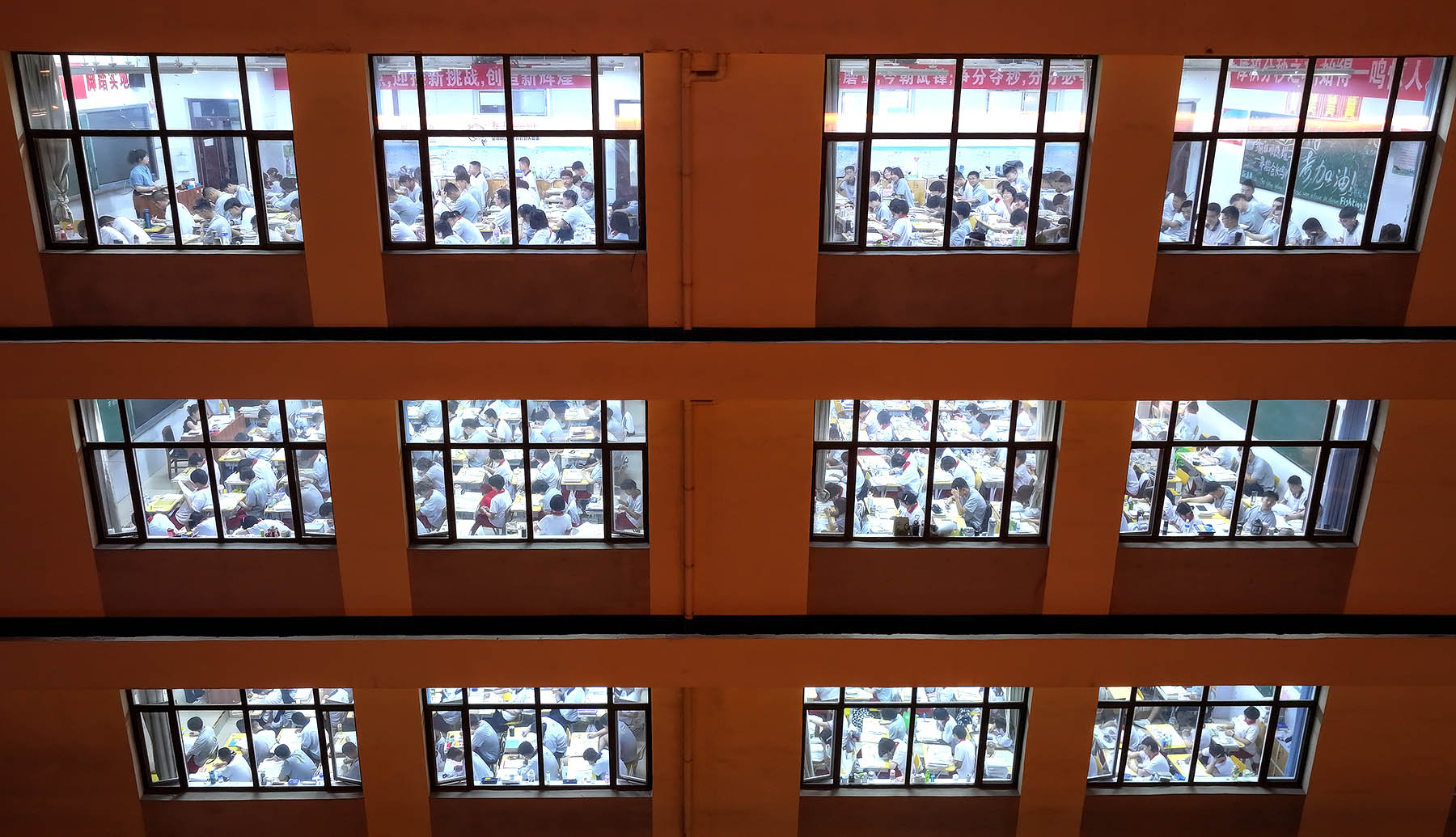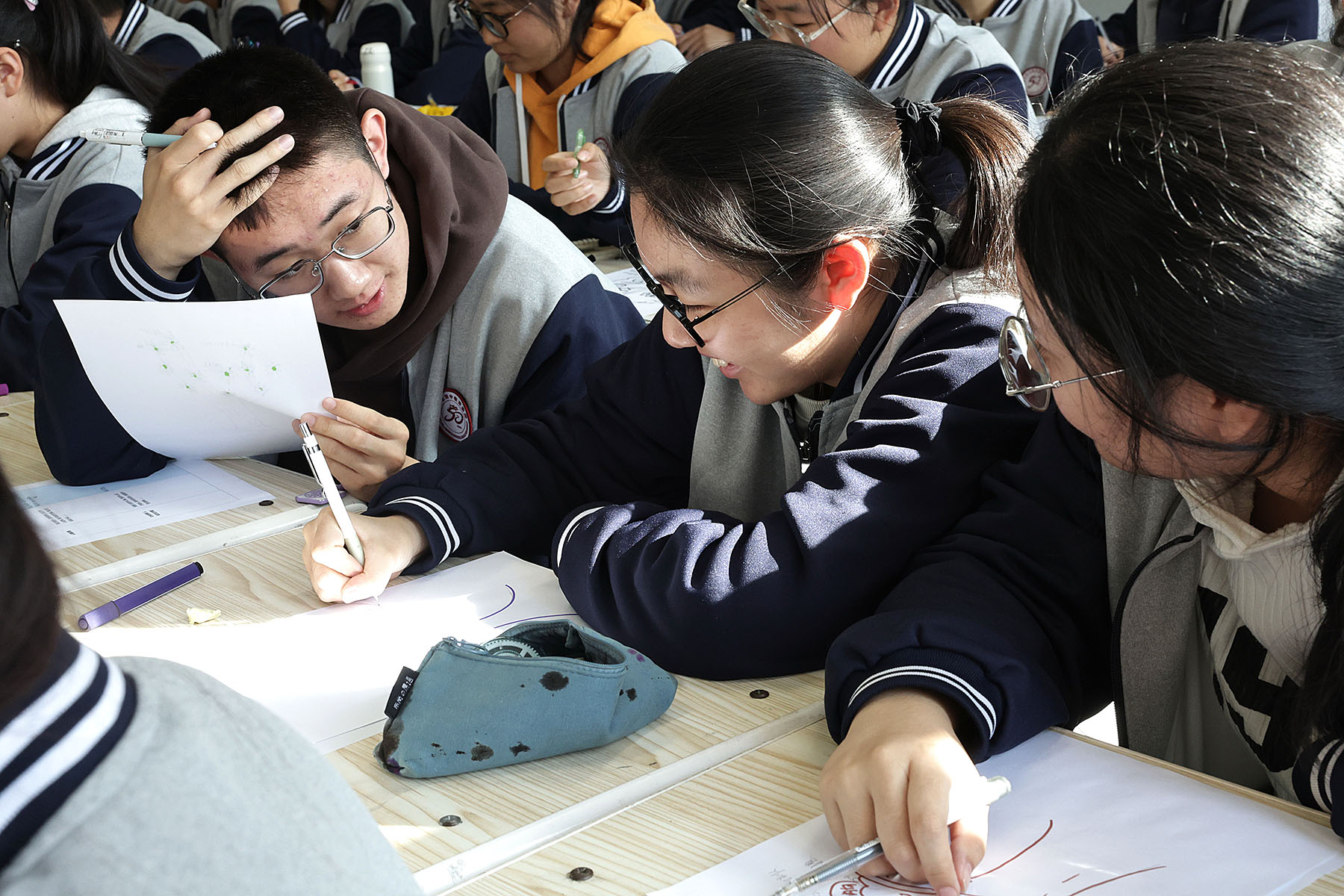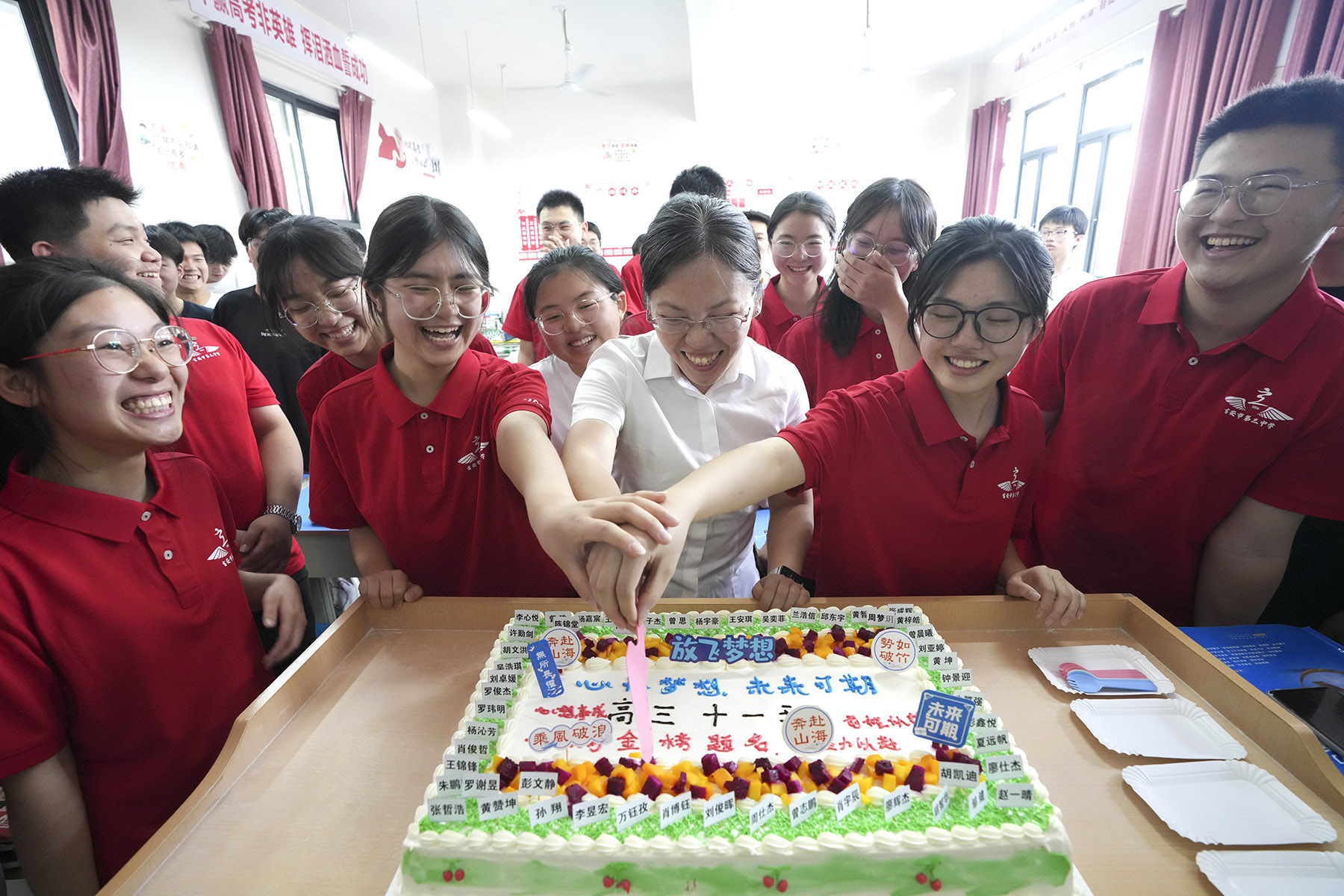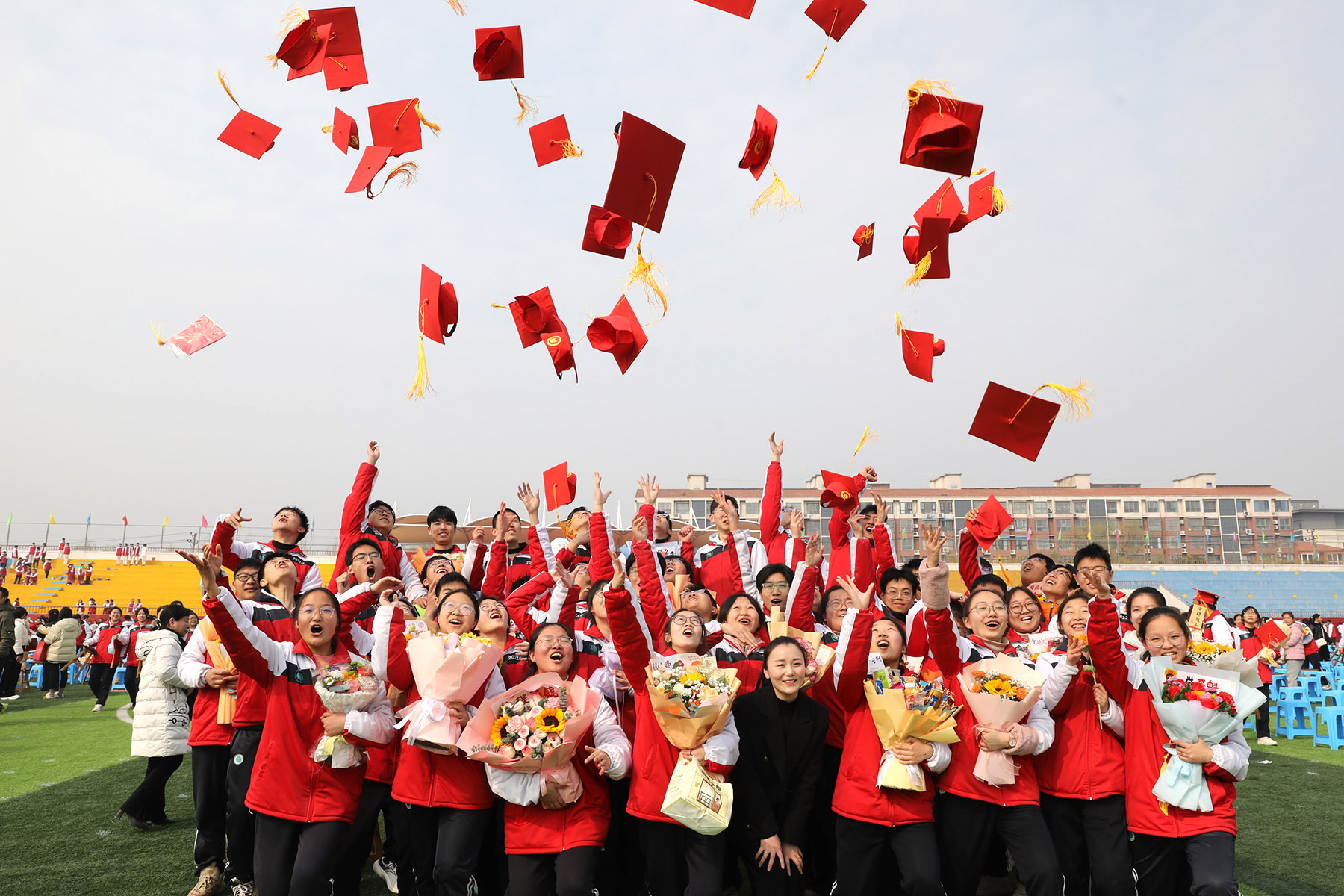Policy to enforce two-day break sees mixed response of anxiety, relief

The recent enforcement of a two-day weekend break policy for high school students in China has sparked widespread debate, and a mix of reactions including relief, anxiety and resistance among students, teachers and parents.
Some argue it is a much-needed opportunity for stressed students to recharge their batteries, while others fear it will only hinder academic progress in regions with fewer education resources.
In the past, it was common for high school students to take classes during the weekend in preparation for the all-important national college entrance exam, or gaokao. However, after the new semester began in early spring, students in multiple provinces including Zhejiang, Jiangsu, Hunan and Guangdong can now enjoy two-day weekends.
READ MORE: Record 13.42m Chinese students take fiercely competitive college exam
Since April 11, the Ministry of Education has publicly punished a number of high schools in Hebei, Jiangsu and Henan provinces for having classes during weekends. The punishments follow a 2022 guideline issued by the ministry reiterating that high schools should not organize classes or tutoring sessions during weekends.
Three high school administrators in Henan have been removed from their posts, four schools in Jiangsu have had their honorary titles removed, while several schools in Hebei have been excluded from receiving awards for three years, all for policy violations.
The change, also aimed at countering the culture of excessive competition, has exposed the challenges in balancing educational equity, students' mental health, and the rigid demands of the gaokao.
The gaokao system, which prioritizes test scores for university admissions, remains the new policy's greatest challenge. Schools and parents equate long study hours with success, and in regions where students have relied on weekend classes to offset resource gaps there is wariness about the two-day weekend break.
Proponents of the enforcement, however, argue it aligns with broader educational reforms to nurture "well-rounded" individuals. They believe weekends can help students rediscover joy in activities such as sports and art — experiences crucial for emotional resilience. Research also suggests that adequate rest improves cognitive function, potentially boosting long-term academic performance.

Under pressure
Lou Binyixuan, an 18-year-old art student in Changsha, Hunan, embodies the paradox of the policy for seniors.
Her school recently shifted from a one-day break every two weeks to one day off every week — a change she welcomes but is reluctant to fully embrace.
Despite the extra day off, she chooses to still spend it studying. "I don't want to study on my day off, but I have to because I want to go to a good university," she admits.
Her dream of attending Chongqing University hinges on her final scores in the gaokao, a pressure that drives her to spend her "free "day at school self-study sessions.
"If I sleep in, I feel guilty — like I've wasted time that could've been spent catching up," she explains.
"The reason that there are different tiers of universities means those who go to the good ones can enjoy better future development, so I am very motivated, but sometimes also lazy."
Lou's classmates are equally torn, she said. While some prioritize rest, others follow her routine.
"Out of 48 students, maybe 10 come to school on weekends. The rest stay home, but I doubt they're relaxing. Everyone's terrified of falling behind," she said.
She reserves her sharpest criticism for her school's defiance of national holiday norms, such as its granting only one day off during the three-day Qingming Festival in April.
"They forced us to 'self-study' at school while other students enjoyed their break. I want to study, not be forced to," Lou said.
However, for Long Qianxun, a 16-year-old freshman in Changsha, Hunan, the enforcement has been transformative.
Now, with two days off on the weekend, she sleeps until 10 am, attends a two-hour math tutoring session, and unwinds at family outings. "With more rest on weekends, I am now more energetic during weekdays," she said.
Her parents confiscate her mobile phone before midnight, so she cannot stay glued to it.
Even though she also wants to go to a top university, Long does not want to engage in aimless competition with her classmates, which makes her unhappy.
"Before, a student with top grades would cry in class or say she 'wanted to die' from the stress. This frightened me," she said.
While Long is not among the top students in her class, she believes she can gradually catch up. However, more important than grades are physical and psychological well-being, a sentiment her parents agree with, she added.

Teachers' perspectives
Many teachers have championed the policy's potential to heal what they see as a broken system.
Deng, a Chinese teacher from Zhengzhou, Henan province, said the policy, which was implemented on March 20 at her school, allows non-seniors to rest at home, while seniors can voluntarily stay on campus for self-study.
Although students' after-school pressure has decreased, the shortened class hours haven't resulted in reductions of the curriculum. Some students find the weekends too relaxing and struggle with self-control, while others feel the time off is just right, she said.
For ordinary families, the gaokao remains a critical opportunity to change their children's fate. However, prolonged studying risks causing anxiety, physical strain, and even illnesses like depression, said Deng, who chose to use one name.
Students most-affected by the enforcement are mid-to-lower achievers lacking self-discipline and parental supervision who are likely to slip further behind, while self-motivated students can adapt well, Deng said.
"At my school, students now balance leisure and study more openly. They return refreshed, sharing weekend experiences, which boosts mental health," she said.
Deng said her feelings about the policy were divided.
"While we tell students grades aren't everything, the reality is scores define their future. For ordinary families, grades are everything," she said.
Lan, a high school teacher from Shuozhou, Shanxi province, expressed strong support for the policy.
At his school, junior grades have adopted two-day weekends, but seniors still follow a 1.5-day break every two weeks.
Lan, who preferred to use one name, said many parents have resisted the policy, complaining their children "waste time on phones at home".
They prefer keeping their children at school and "out of sight, out of mind", he said.
"As a front-line teacher, I firmly believe dual rest days are urgently needed. Students operate like machines, and nearly every class has several students who've developed psychological issues or dropped out due to academic pressure. Rest allows them to 'feed their souls', explore passions and reconnect with nature," he said.
Despite the need for students to recharge their batteries, schools compete fiercely for limited resources, measuring success by gaokao rankings. This culture of spending excessive time studying — fueled by institutions like Hengshui High School Hebei in Hebei province known nationwide for its strict study regimen — must end, he stressed. "Learning should be part of life, not its entirety," he said, adding all students crave free weekends.
Lang Shiyuan, an English teacher from Changsha No 1 High School in Hunan said his school introduced the policy around the third week of the semester, and banned organized classes on weekends.
Students now voluntarily study in open classrooms. Some parents worry because top students in other regions still study on weekends, he said. "Personally, I support the policy. Teachers can finally get more rest," he said.
While grades may dip, the policy benefits holistic development and identifies truly capable learners, he said.
He hopes it continues despite some short-term pains.

Ethics, legal aspects
The two-day weekend policy, though imperfect, marks a pivotal shift toward valuing students as humans, not just exam-takers, experts said. China's schools aren't just changing schedules — they're reimagining what it means to learn, live and thrive, they said.
Wang Ming, a researcher at the China National Institute of Educational Sciences, told the Paper.cn that extending students' school hours and organizing holiday makeup classes to study for college entrance exams directly violate regulations, and contradict the principles of lawful, standardized school operations.
Chu Hongqi, a professor at Beijing Normal University's Institute of Education and Social Development, said high school two-day weekends are legally and ethically justified.
ALSO READ: Fighting for future
In 1995, the State Council, China's Cabinet, mandated a five-day school week for primary and secondary school students. There are also policies explicitly prohibiting schools from organizing makeup classes during weekends, holidays, or vacations, he said.
Chu said weekend rest is a legal right and no entity or individual can infringe upon it. Schools, families, and stakeholders must collaborate to ensure students' adequate rest and sleep, he said.
Liu Changming, former principal of Beijing No 4 High School, highlighted the need for two-day weekends. "Excessive academic pressure, prolonged study hours, and cutthroat competition deprive students of sleep, exercise, and free time, leading to burnout, psychological issues, and emptiness syndrome, which stems from a lack of purpose," he said.
Without adequate free time to explore life, society, nature, or their own interests, students cannot develop goals or autonomy. Restoring moderate leisure time and decision-making power to high schoolers is crucial, he said.
Contact the writer at zoushuo@chinadaily.com.cn


